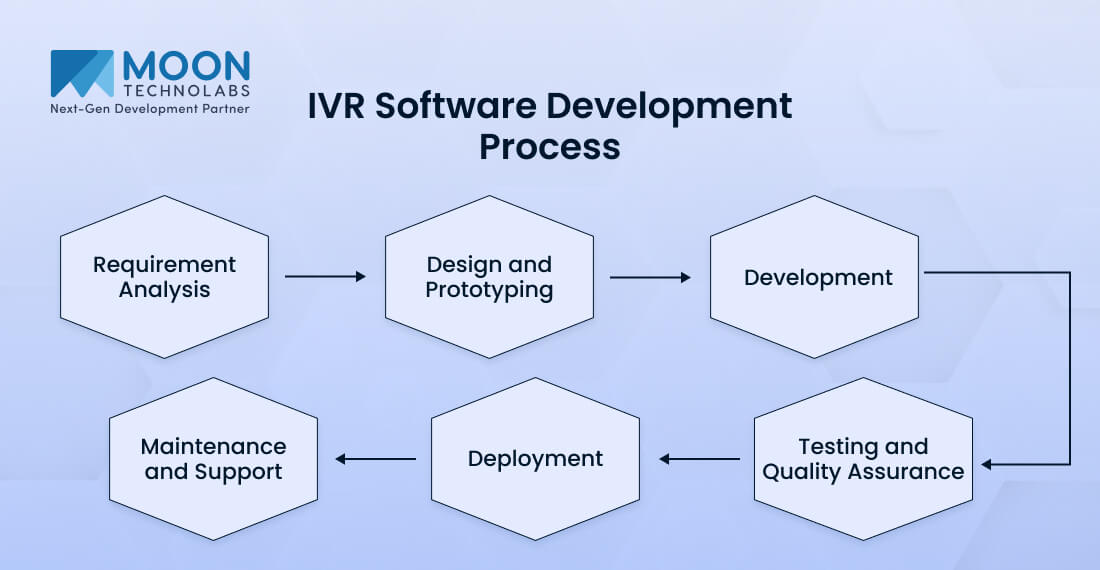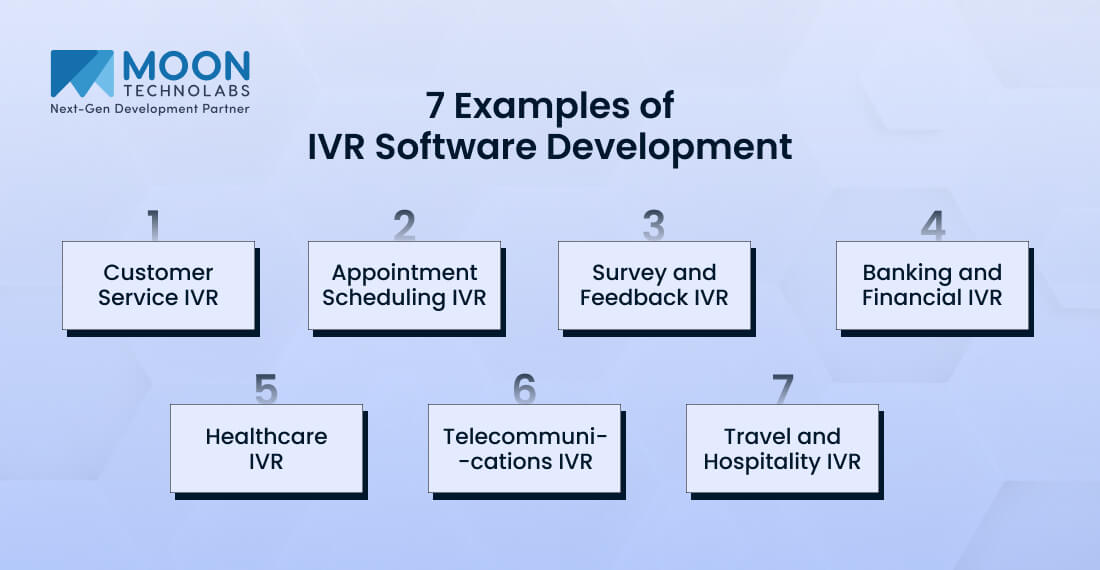Table of Content
Table of Content
Customer experiences are leading the charge for almost every business today. If your business fails to enter this race, it can become critical for your brand image. However, automated customer interactions can help solve customer inquiries in a much more efficient way while reducing wait times and improving the customer experience.
Enter Interactive Voice Response (IVR) systems, which allow businesses to accommodate increased call volumes. IVR systems are easy to scale as they free up human tasks, reduce costs, and can handle more complex inquiries.
.In this guide, we will walk you through the process of IVR Software Development, explore different types of IVR systems, and highlight the latest trends in this field.
IVR Software Development lets you create an automated telephony system to interact with callers over the phone. It’s like building a virtual receptionist for your business interactions who can gather customer information, understand their queries, and route the calls to the right person.
Your customers can interact with the company’s host system via a telephone keypad or by speech recognition. It can understand what callers are saying and save time for both the customer and the business by responding quickly with pre-recorded messages.
The IVR market has been growing rapidly due to the increasing demand for automation in customer service. According to the Data Bridge Market, the global IVR market is expected to touch USD 185,560 million by 2030.
Companies are investing in IVR systems to enhance customer satisfaction, improve operational efficiency, and reduce costs. With advancements in AI and machine learning, modern IVR systems are becoming more sophisticated, offering personalized and efficient interactions.
There are several types of IVR systems, each designed to meet specific business needs:
Inbound IVR systems manage incoming calls, providing callers with options to navigate through a menu to reach the desired department or service.
Use Cases: These systems are commonly used in customer service centers, appointment scheduling, surveys, and feedback.
Outbound IVR systems initiate calls to customers and are often used to send notifications, reminders, or surveys. These systems are beneficial for marketing campaigns and customer engagement.
Blended IVR combines inbound and outbound capabilities, allowing businesses to manage both incoming and outgoing calls efficiently. This type of system is ideal for organizations that require a balance of customer service and proactive customer outreach.
Speech Recognition IVR utilizes voice commands instead of keypad inputs, offering a more natural and intuitive way for customers to interact with the system. This type of IVR is particularly useful for industries where hands-free interaction is preferred.
Touch-tone IVR systems rely on keypad inputs to navigate through the menu. This is the most traditional form of IVR and is widely used due to its simplicity and reliability.
The IVR landscape is evolving rapidly, with several key trends shaping the future of this technology:
AI is enhancing IVR systems by making them smarter with natural language processing (NLP) and machine learning capabilities. The interactions are more accurate as NLP allows us to understand and respond better.
Modern IVR systems are increasingly offering personalized user experiences based on caller data, such as previous interactions and preferences, leading to more satisfying customer experiences.
IVR systems are becoming part of a broader omnichannel strategy. Businesses are able to offer seamless interactions across multiple communication channels, including voice, chat, and email.
Cloud-based IVR solutions offer increased flexibility, scalability, and cost-effectiveness, making them a popular choice for businesses of all sizes.
Voice biometrics is being integrated into IVR systems to enhance security. This technology uses a caller’s voice as a unique identifier, reducing the risk of fraud.
As businesses expand globally, the demand for multilingual IVR systems is growing. Offering support in multiple languages helps companies cater to a diverse customer base.
Developing a custom IVR system involves several key steps:

The first step is to understand the client’s needs and define the project scope. This involves identifying the target audience, key functionalities, and desired outcomes.
Once the requirements are clear, the design phase begins. This includes creating user interfaces and workflow prototypes to ensure a smooth user experience.
The development phase involves coding and integrating various components, such as the IVR script, call flow, and database integration.
Testing is crucial to ensure the IVR system functions as expected. This phase involves rigorous testing for functionality, reliability, and user experience.
Once testing is complete, the system is deployed. This includes implementing the IVR system and training staff on how to use and manage it.
Ongoing maintenance and support are essential to keep the IVR system up-to-date and functioning smoothly. This includes regular updates, troubleshooting, and technical support.
Here’s a table outlining the features of custom IVR software development:
| Feature | Description |
|---|---|
| Customizable Call Flows | Tailored to specific business needs, allowing for personalized customer interactions. |
| Advanced Analytics and Reporting | Provides insights into call data and performance, helping businesses optimize their IVR system. |
| CRM Integration | Seamless integration with customer relationship management systems for a unified customer service experience. |
| Self-service Options | Allows users to resolve issues without human assistance, reducing the need for live agents. |
| Scalability | Ability to handle varying call volumes, ensuring consistent performance as your business grows. |
| Security and Compliance | Ensures data protection and regulatory adherence, keeping customer information safe and secure. |

Customer Service IVR systems automate the handling of common customer inquiries, such as account information, troubleshooting, and FAQs. By providing quick and consistent responses, these systems reduce the need for live agents and enhance customer satisfaction.
Appointment Scheduling IVR systems efficiently manage bookings, reminders, and cancellations. They streamline administrative tasks by allowing customers to schedule and modify appointments via automated prompts, freeing up staff to focus on other responsibilities.
Survey and Feedback IVR systems collect valuable customer opinions through automated phone surveys. These systems are ideal for gathering insights on customer satisfaction, product feedback, and service improvement opportunities directly from the users.
Banking and Financial IVR systems offer secure, automated handling of transactions, account inquiries, and balance checks. Customers can perform essential banking tasks over the phone, ensuring convenience and maintaining high-security standards.
Healthcare IVR systems manage patient interactions by automating appointment scheduling, prescription refills, and medical information inquiries. This reduces the workload on healthcare providers and ensures patients receive timely assistance and information.
Telecommunications IVR systems support mobile and internet services by automating common customer interactions, such as troubleshooting network issues, checking data usage, and billing inquiries. This helps telecom companies provide consistent and efficient service.
Travel and Hospitality IVR systems enhance customer experiences by automating booking processes, providing travel information, and handling reservations. These systems ensure that customers can access important travel details and services 24/7, improving overall satisfaction.
These examples demonstrate how IVR systems can be tailored to meet the specific needs of various industries, enhancing efficiency and customer satisfaction across the board.
When developing a custom IVR system, consider factors such as scalability, integration with existing systems, user experience, and security. It’s essential to choose a development partner who understands your business needs and can deliver a solution that meets your expectations.
Moon Technolabs offers comprehensive IVR software development services tailored to your business needs. With a team of experienced developers, we provide end-to-end solutions, from requirement analysis to deployment and maintenance. Our focus on innovation and customer satisfaction ensures that you receive a top-quality IVR system that drives your business forward.
Streamline communication and enhance caller satisfaction with our tailored IVR solutions designed to fit your business needs.
Building an IVR system is a complex process that requires careful planning and execution. By understanding the different types of IVR systems, keeping up with the latest trends, and following a structured development process, you can create an IVR system that enhances customer experience and improves operational efficiency.
01
02
03
04
Submitting the form below will ensure a prompt response from us.